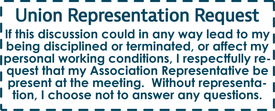Employee's Right to Union Representation
 Weingarten Rights…do you know them?
Weingarten Rights…do you know them?
The rights of unionized employees to have present a union representative during investigatory interviews were announced by the U.S. Supreme Court in a 1975 case (NLRB vs. Weingarten, Inc. 420 U.S. 251, 88 LRRM 2689). These rights have become known as the Weingarten rights.
Red Flag Moments
There are moments in the life of an education employee that should cause concern and “raise red flags” for a school employee before participating in a meeting with a building administrator or supervisor. Many times school employees will acquiesce to questioning without representation. That’s not a wise decision. The following list of phrases and situations commonly occur. When faced with the situations and phrases listed members should take it as a silent signal to that it’s time to find the first available association representative. Check out the phraseology!
-
You may need a building rep when a building administrator says, “I just want to talk to you for a minute.” And then. . .
-
You walk into the office and the parent and principal are seated on the same side of the table.
-
There are two district administrators or even the superintendent in the office to meet with you and they didn’t bother to tell you what the meeting was about.
-
-
You may need a building rep when, the administrator starts getting “hot-under-the-collar” with you and you’re alone.
-
You may need a building rep when the building administrator says, “I’ve had some parent complaints about you.”
-
You may need a building rep when the building administrator says, “I have some concerns we need to talk about.”
-
You may need a building rep when the building administrator says, “There are rumors in the community about you that we need to discuss.”
-
You DEFINITELY need a building rep when the building administrator says, “Do you want a building rep?” THE ANSWER IS AWAYS, “YES!” If a building administrator is offering representation before the meeting takes place, the member must take it as a clue that the meeting is not going to be a happy event.
-
You DEFINITELY need a building rep when the building administrator uses the following words in the course of the meeting: discipline, termination, employment status, or negative evaluation.
Know your Weingarten Rights—Employee’s Right to Union Representation
Employees have Weingarten rights only during investigatory interviews.
ï‚· An investigatory interview occurs when a supervisor questions an employee
ï‚· If an employee has a reasonable belief that discipline or other adverse
ï‚· Management is not required to inform the employee of his/her Weingarten to obtain information which could be used as a basis for discipline or asks an employee to defend his or her conduct. Consequences may result from what he or she says, the employee has the right to request union representation. rights; it is the employees responsibility to know and request.
When the employee makes the request for a union representative to be present management has three options:
(I) it can stop questioning until the representative arrives.
(2) it can call off the interview or,
(3) it can tell the employee that it will call off the interview unless the employee voluntarily gives up his/her rights to a union representative (an option the employee should always refuse.) Once you have asked for union representation, any attempt by management to continue asking questions before a union representative gets there is ILLEGAL. If supervisors pressure you by telling you that “you’re only making things worse for yourself” by asking for union representation, that is against the law too. Employers will often assert that the only role of a union representative in an investigatory interview is to observe the discussion. The Supreme Court, however, clearly acknowledges a representative’s right to assist and counsel workers during the interview. The Supreme Court has also ruled that during an investigatory interview management must inform the union representative of the subject of the interrogation. The representative must also be allowed to speak privately with the employee before the interview. During the questioning, the representative can interrupt to clarify a question or to object to confusing or intimidating tactics. While the interview is in progress the representative can not tell the employee what to say but he may advise them on how to answer a question. At the end of the interview the union representative can add information to support the employee’s case.What to say if management asks questions that could lead to discipline:“If this discussion could in any way lead to my being disciplined or terminated, or affect my personal working conditions, I request that my union representative, officer, or building representative be present at the meeting. Without representation, I choose not to answer any questions.”Questions? If at any time you are concerned about an interaction with a supervisor contact your building representative or local president.
